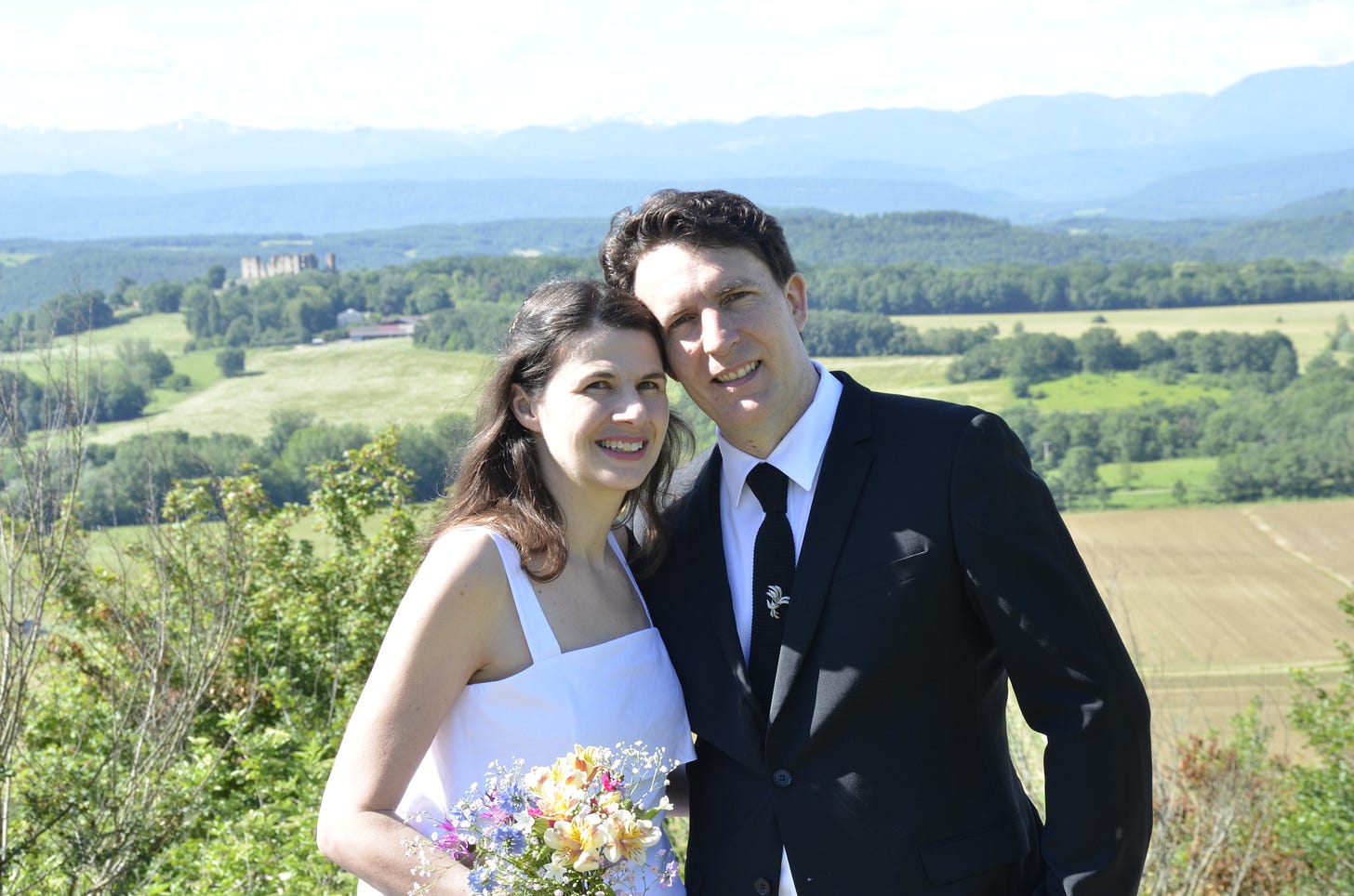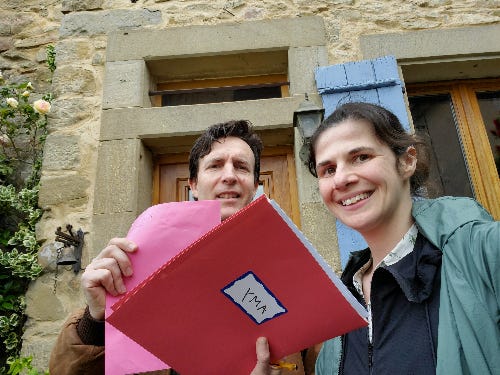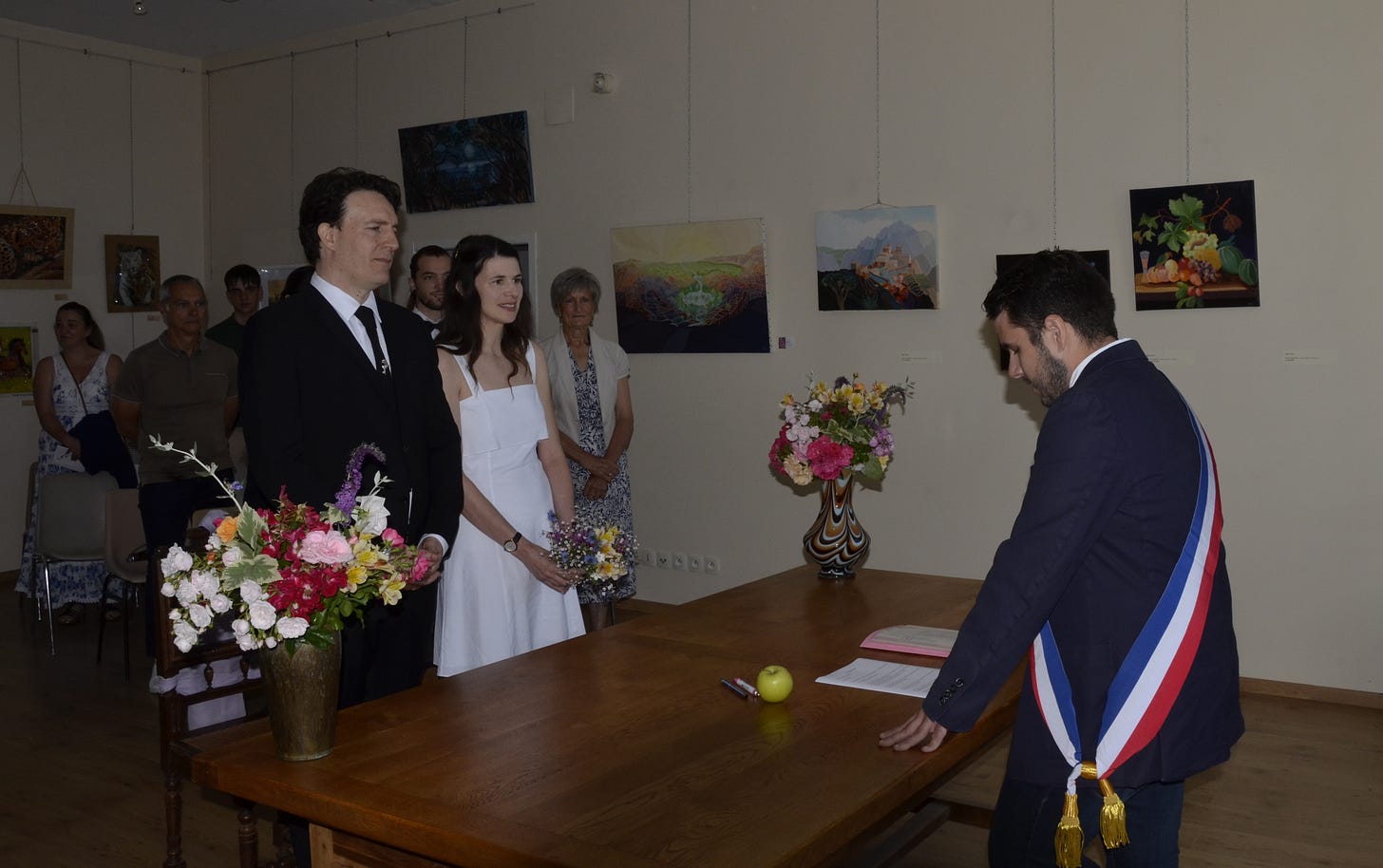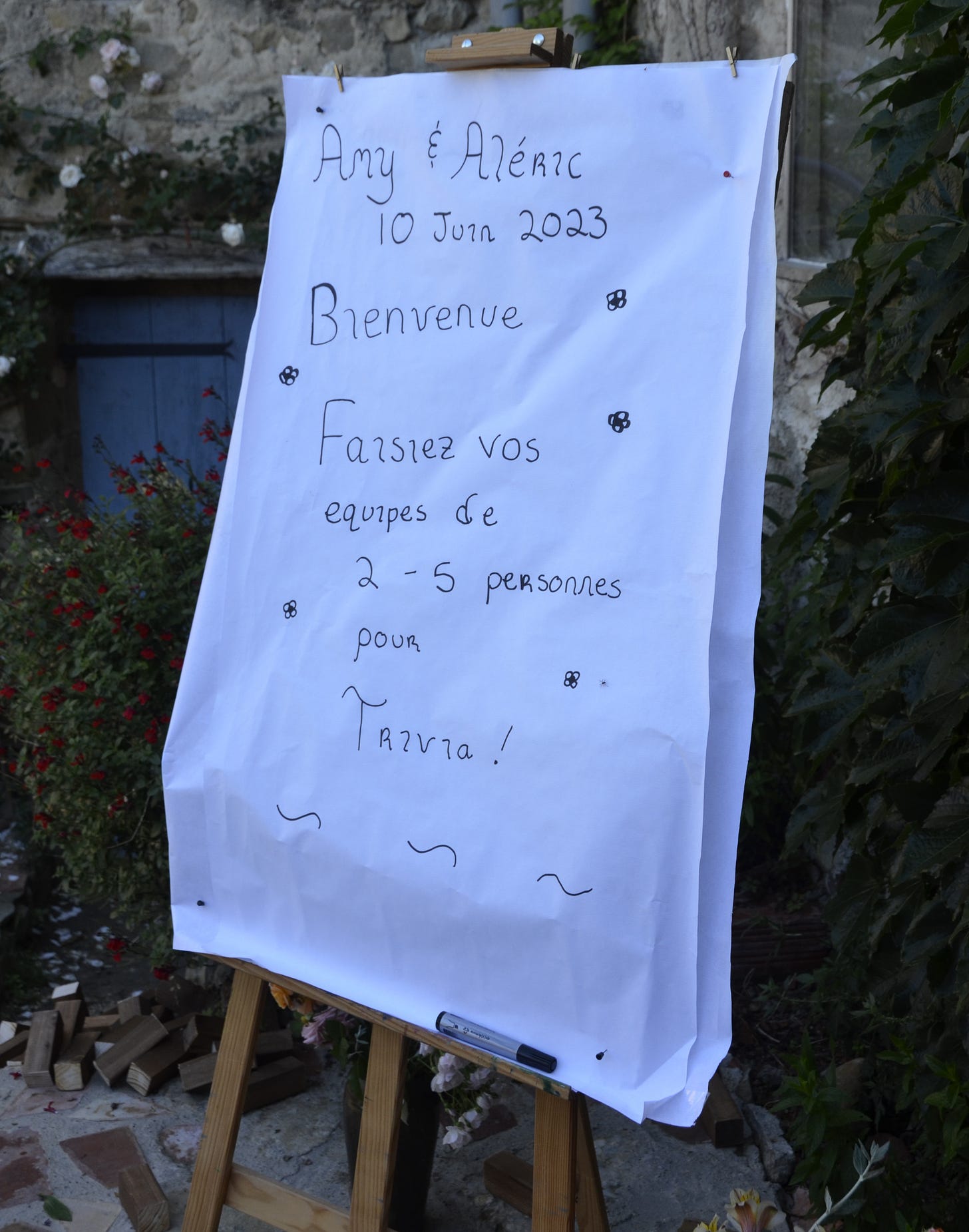Getting Married in France
Two years ago today, Aléric and I said "oui" to each other at the mairie (aka city hall) in Roumengoux, France.
In honor of our second anniversary, I thought I'd recap what it's like getting married in France.
The Rules
I've never gotten married in the U.S, so I can't make a direct comparison of how the process works here versus there. But what I can say is that there are a few more hoops to jump through before you can legally tie the knot in France.
For one thing, one partner needs to be a resident of France for at least 40 days before the ceremony. Or, one of their parents needs to be a resident of France.
Keep in mind that residency is different from a short-term stay. So, if you both live in another country and have no ties to France, you can't simply book an AirBnb for a month and a half and legally get married here. You need to have a lasting connection to the place.
In our case, Aléric was a resident of Roumengoux when we got married.
A few other, somewhat obvious, rules apply. You need to be of legal age and you can't be married to someone else.
The Documents
France loves dossiers. So it should be no surprise that you need to assemble a file to present to the city hall before you can get married. The file includes identifying information and proof of residence.
I needed to get a copy of my birth certificate to present to the mairie. But it couldn't just be any copy. It had to be apostilled and then translated into French by a certified translator. It was also supposed to be less than six months old.
Maybe it's easier in other states, but in PA, to get an apostilled birth certificate, you first have to fill out the form for a copy of the certificate. Then, once you get that in the mail, you need to send it back to Harrisburg with another form (and another payment) for the apostille. Once they send that back to you, you're good to go.
With the certificate and apostille in hand, I set about searching for a translator. I got a recommendation from a friend in France and did some Google searching. Eventually, Aléric connected with someone online and I ended up working with her. I think the rate was something like 45 euro per page, which is about average.
In addition to my acte de naissance, I also had to provide a copy of my gas bill and my passport. It was the same for Aléric, except his birth certificate had to be less than three months old. I think we also signed something that swore we weren't already married.
Witnesses
We also needed to have witnesses for the ceremony, and had to provide the mairie with their information before the ceremony. I think you need to have at least one witness per person getting married, we had three: two friends of Aléric's mom and one of his cousins.
The Meeting With the Mayor
Once we had our dossier assembled, we had a sit-down meeting with the mayor of Roumengoux to go over everything. I think in bigger towns/cities you probably meet with someone who works for city hall rather than the mayor themselves, but this is a tiny village.
During the meeting, he basically looked at our documents and confirmed that everything was there. We then picked a date, Saturday, June 10 2023. As it turns out, we were the second marriage in the village that year.
After that, the mairie published the banns, which basically just listed our information and the fact that we were getting married. The banns has to be posted for 10 days and you can't get married before that 10 day period is up.
The Ceremony
In France, you have to have a civil ceremony and the civil ceremony has to take place before a religious one. Since we're not religious, all we ended up having was the civil ceremony.
Our wedding took place inside the mairie, in the main room. We had initially wanted to have it outdoors in the courtyard behind the mairie, but the mayor was concerned about the risk of rain (which was forecast for that day). So inside it was. We decorated the space with paintings by Aléric's mom and flowers from her garden.
The French civil wedding ceremony is pretty straightforward. We had two words to say: "non" and then "oui." There's no "I do" like in the U.S. and we didn't write vows or anything.
We did have the opportunity to customize our ceremony a bit, and we added in something involving an apple and some stuff about its symbolism. I don't know if that's the norm or not.
There was also the option of exchanging rings, but since we didn't have them yet, we skipped that.
After the "oui," we and our witnesses signed the marriage certificates. We were also given a Livret de Famille, which records our marriage and will record the births of any children we have.
Guests
We kept the wedding pretty small, and only invited a handful of people—Aléric's cousins who live in the area, some friends of his mom and their families, the next door neighbors in the village, and the photographer (who took the photos for free).
Technically, the ceremony itself was open to the public, so any resident or even just passerby in Roumengoux that day could have stopped in and watched. No one did, though.
Reception
Our wedding was very much a DIY affair. Aléric and I made the food we served (sandwiches and tarts), with the exception of the cake, which was made by a neighbor/family friend who also happens to be a former professional baker. I made a playlist on YouTube music and we played it over a Bluetooth soundbar. The flowers all came from his mom's garden and we made the rest of the decor ourselves (I bet you can guess who wrote the misspelled sign).
I don't want you to think that all French weddings are like ours—our celebration definitely fell on the simpler end of the scale.
There was some concern that the weather wouldn't cooperate and that it'd be stormy that day, but we got lucky and were able to have the reception in the back garden. As a back-up, we'd booked and set up the common area in the local gite, but to be honest, it didn't look nearly as nice, so I'm happy we got to have it outside.
The reception was short and sweet. We did a champagne toast, people ate lunch, we played a trivia game and gave out prizes, we cut the cake, then we hightailed it to the Carcassonne airport to head off to London for our honeymoon.
Honeymooning
We spent a few days in London for our honeymoon. It was perfect timing, as there was a Hilma af Klint and Piet Mondrain exhibition on at the Tate Modern. We also visited Notting Hill, including the bookstore that Hugh Grant owns in the movie. Aléric wanted to do some touristy stuff (I want the record to show that I was firmly against this), so we watched the changing of the guards and looked at the palace.
Why Get Married in France?
We decided to get married in France rather than the U.S. for a few reasons. First, we knew we would eventually settle in the country permanently, and it seemed more streamlined to have the ceremony and documentation here. If we had gotten married in the U.S., we'd have to transcribe our marriage in France to get it on the books here and to get our Livret de Famille.
The second reason is the U.S. wedding industrial complex. We did have a small celebration in Pennsylvania after the French wedding, but it would have been hard to keep things as simple and low-cost in the U.S. as we did in France.












Happy 2nd wedding anniversary, Amy and Aléric!!